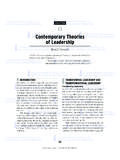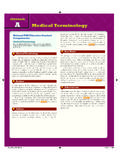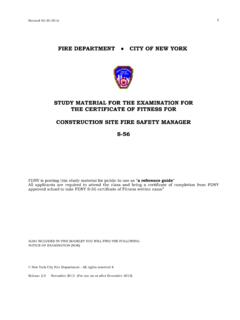Transcription of Health Care: How is it Different from “Industry”?
1 21 Chapter 2 Health Care: How is it Different from industry ?The end product of all business is people. Rensis LikertCHAPTER OBJECTIVES examine management in Health care and in industry for similarities and criteria for describing or typing organizations according to genuine dif- ferences rather than by product or the various settings in which present-day Health care is delivered. establish an appropriate overall perspective of the organization of the healthcare several key departmental characteristics that serve as determinants of individual management style. SITUATION: THE CASE OF THE STUBBORN EMPLOYEE, OR, IT ISN T IN THE JOB DESCRIPTION George Morton, manager of the maintenance department, was experiencing increasing frustration with mechanic Jeff thompson. Morton considered thompson a good mechanic, and this opinion was usually reinforced by the consistently high quality of thompson s preventive maintenance work and by his success in accomplishing difficult repair jobs.
2 Morton s frustration centered about thompson s apparent lack of motivation. thompson always had to be told what to do next after completing each job. If he were not so instructed, he would take a prolonged break until Morton sought him out and gave him a specific s frustration peaked one day when a small plumbing problem got out of hand and suddenly became a large problem. he knew that thompson had to have seen the leaking valve because it was right beside the pump that thompson had been servicing . however, when Morton asked thompson why he had done nothing about the valve, thompson said, plumbing isn t part of my job. You could at least have reported the problem, Morton shrugged and said, there s nothing in my job description about reporting anything. I do what I m paid to do, and I stick to my job description.
3 You certainly do, said Morton. Jeff, you re one of the better mechanics I ve seen. But you never extend yourself in any way, never reach out and take care of something without being told. I m not paid to reach out or extend myself. You re the boss, and I do what you tell me to do. and I do it right. 216/21/11 9:31:13 AM Jones & Bartlett Learning, LLC. NOT FOR SALE OR DISTRIBUTION22 Chapter 2 Health Care: how is it Different from industry ? I know you do it right, Morton agreed. But I also know that you some-times stretch out the work. I know you re capable of giving a lot more to the job, but for some reason you seem unwilling to work up to your capabilities. again thompson shrugged. I stick to my job description and do what I m told. InstructionsInitially, imagine yourself in George Morton s position and think about how you might wish to address employee thompson s attitude.
4 Then consider the following questions as elements of appropriate responses are developed throughout this chapter:What are the characteristics of a position like Jeff thompson s that 1. should influence the group manager s style and approach?Should Morton s management approach focus primarily on the task to 2. be done (production centered) or the person assigned to the task (people centered)?Do you basically agree or disagree with thompson s literal adherence to 3. his job description? Why?again imagining yourself in Morton s position, describe one or two ways 4. in which you might go about getting this employee to perform more in line with his VERSUS ENVIRONMENTThe Controversyto begin consideration of the healthcare environment, we briefly examine the opposing sides of an age-old argument:It doesn t matter how well it worked in a factory, it won t work here this is a hospital [or nursing home, urgent care center , or whatever].
5 VersusGood management is good management no matter where it s prac-ticed. What worked elsewhere will work in a healthcare organization as it is intended for this book to address management in the healthcare organization in some detail, it would seem sensible to decide first which side of this frequently encountered argument, if either, is the determining consid-eration and should thus govern the approach to supervising people in the Health care environment. Should we focus on management and thus agree that good management is good management no matter where it s practiced, or should we give the most weight to the environment, agreeing that Health care is sufficiently Different to warrant a completely Different approach to management?healthcare managers are often divided on the fundamental issue of process versus environment.
6 Listen carefully to the comments you are likely to hear 226/21/11 9:31:13 AM Jones & Bartlett Learning, LLC. NOT FOR SALE OR DISTRIBUTIONP rocess Versus Environment 23 regarding the introduction of certain techniques into the healthcare organi-zation by people in fields other than Health care. Often all organizational con-siderations are split into two distinct categories, which are then assumed to be inconsistent with each other. these considerations can be condensed to Health care versus industry , with the latter category including manufactur-ing, commercial, financial, retail, and all other organizations not specifically devoted to the delivery of Health care. Further, in this simplistic comparison, industry frequently becomes something of a dirty word. ( after all, we deal in human life. )The Nature of the Healthcare OrganizationIt is not at all surprising that the process-versus-environment argument exists when one considers the evolution and character of the healthcare orga-nization.
7 The function of the hospital as we know it today is largely a product of the past century. Many of the healthcare institutions of the past century provided only custodial care; they were places where the sick, usually the poor and the disadvantaged, were housed and cared for until they died. physicians practiced very little in hospitals, and most persons fortunate enough to be able to afford proper care were tended to at home or in private the hospital of the past there was but one medical profession: nursing. the mission of the organization was nursing care, and essentially the only management was the management of nursing care. also, most healthcare institutions were charitable organizations operated by churches or social wel-fare groups, and little thought was given to operating a healthcare institution like a business.
8 The modern healthcare organization is vastly Different from its counterpart of a century or more ago. What used to be the major purpose of a hospital maintaining sick people in some degree of comfort until they died is now the primary mission of only a relatively few healthcare organizations created for the care of the terminally ill (for example, hospices and certain other special-ized institutions). the role of the hospital evolved into that of an organization dedicated to restoring Health and preserving life with an increasing emphasis on the prevention of hospital of the past had a unique mission, which it fulfilled in a simple, one-dimensional manner that had no parallel in other kinds of organizations. the only similarity to the activities of other organizations was the direct supervision of the nurses who delivered care: the basic process of getting work done through people.
9 However, the modern healthcare organization is far from one dimensional. there is a large variety of functions to be performed, and numerous complex and sophisticated specialized skills are involved. also, a number of business functions, which are not specifically part of Health care but which are critical to the delivery of Health care, are present in the Health -care organization. We find that in many respects the healthcare organization of today very much resembles a business. In fact, in recent years the prolifera-tion and growth of for-profit hospital corporations, Health maintenance organi-zations, and other healthcare chains demonstrate that Health care is indeed a business and one of significant 236/21/11 9:31:13 AM Jones & Bartlett Learning, LLC. NOT FOR SALE OR DISTRIBUTION24 Chapter 2 Health Care: how is it Different from industry ?
10 The Dividing LinesIt should initially be conceded that many healthcare organizations are com-ing to more closely resemble business organizations of other kinds. this is evident in two dimensions: marketing and competition. In the not-too-distant past, marketing and even modest advertising were virtually unheard of in Health care at least in the not-for-profit arena (the largest healthcare pro-vider component). Now, however, Health care, up to and including the services of high-level professionals, is advertised and marketed like any other product or service. this activity, of course, relates to the intensifying levels of competi-tion which are evident in Health care as provider organizations vie with each other for a share of the , even the growth of competition and marketing does not essentially make management in Health care appreciably Different from what it has long been.















